#russia's invasion backfires
Photo
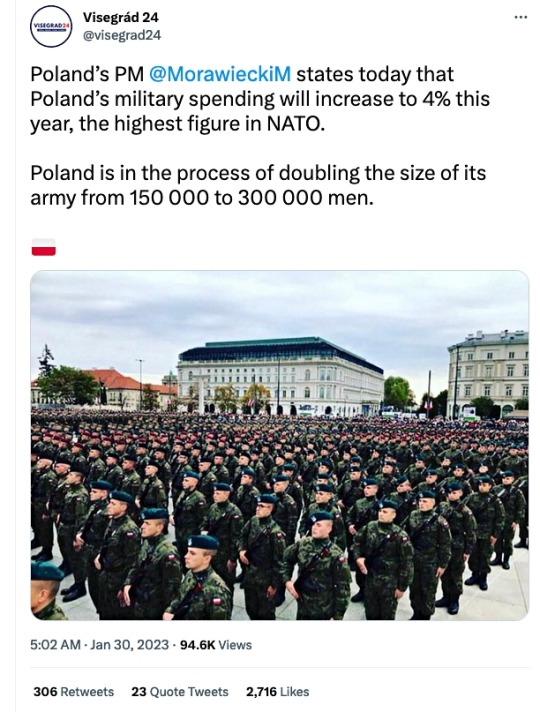
^^^ from @visegrád24
Yet another way Putin’s invasion has had the opposite effect.
Putin has been trying to make Russia great again by throwing its military weight around. He has only succeeded in showing the world he commands a third-rate armed forces and has alarmed neighbors into bolstering their own military establishments.
Poland is the latest country in Europe to announce a significant hike in its national security spending. Some others...
Macron: France to hike military spending by a third
Germany To Buy U.S.-Made Fighter Jets As Military Spending Prompted By War In Ukraine Ramps Up
North Macedonia is set to increase its defense budget to $542 million by 2027, says GlobalData
Yes, even North Macedonia (population: 2,130,936) is not taking its security for granted.
After winning the runoff election on Saturday, Czech President-elect Petr Pavel made a call to President Volodymyr Zelenskyy –– one of his first calls after the election.
Russia’s neighbors are not being cowed into submission by Putin’s aggression. Eastern Europe in particular remembers the 40+ miserable years as satellite states of the USSR and wants no repeat.
#invasion of ukraine#defense spending#nato#national security#poland#france#germany#czech republic#north macedonia#russia#vladimir putin#russia's invasion backfires
31 notes
·
View notes
Text
Biden's visit has concluded. Israel has spent his entire visit trying to muddy the waters of what happened to Al Ahli Hospital and despite their cartoonish efforts, it hasn't worked
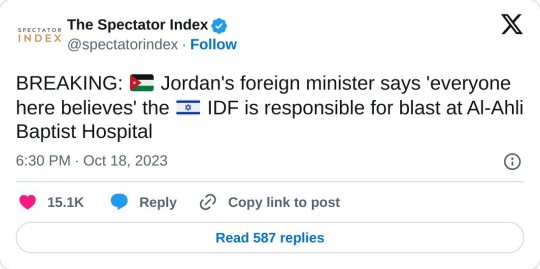
The Global South and especially West Asia know who is responsible for the bombing and no amount of AI voice recordings of 'Hamas operatives' can change that.
Israel war crimes continues to backfire on them even in America

Biden backing Israel has had an impact on America's image. Here's a Wall Street Journal article warning that America's continued support is turning countries towards Russia and China which is code for turning countries against America
An EU official said that the EU will pay a heavy price in the Global South for its continued, unabashed support for Israel
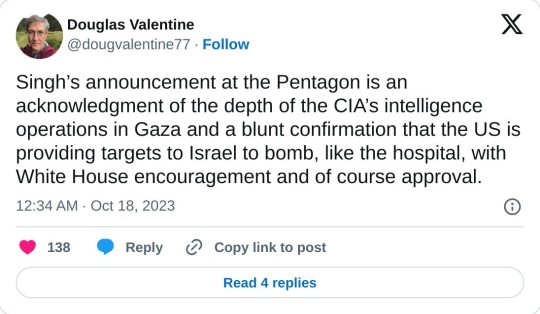
There's also speculation that the Biden administration knew about the bombing before it happened.
Countries that were/are allied with Israel continue to distance themselves from Israel like Russia. The reason I keep highlighting Russia is because the West has been running out of ammunition due to the Russia-Ukraine war and that includes Israel which is rumoured to have sent 80-90% of its ammunition to Ukraine. If this conflict lasts a long time, Israel will need to buy weapons and ammunition and Russia would be one of the countries they would turn to (same with China)
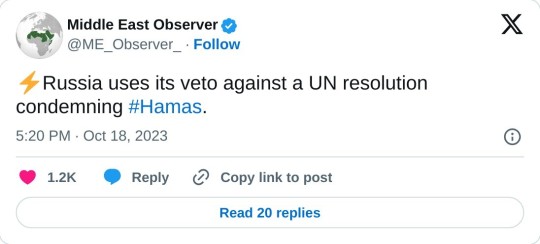
So, where are we in terms of the conflict? After days of waffling over a ground operation in Gaza, Israel postponed it until some time after Biden's visit and now we're back here again
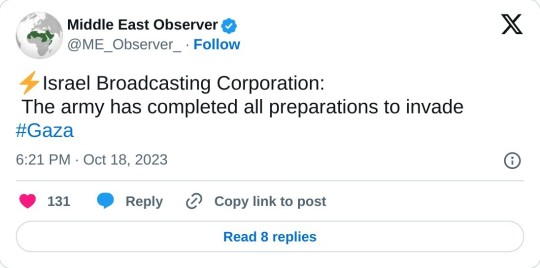

Now I'm no military expert but constantly going back and forth on whether or not you'll invade Gaza is bound to do damage to your troops' morale. No wonder they're dealing with mass desertions while their citizens demonstrate on the streets. The Israeli leadership has no plan besides bombing Gaza.
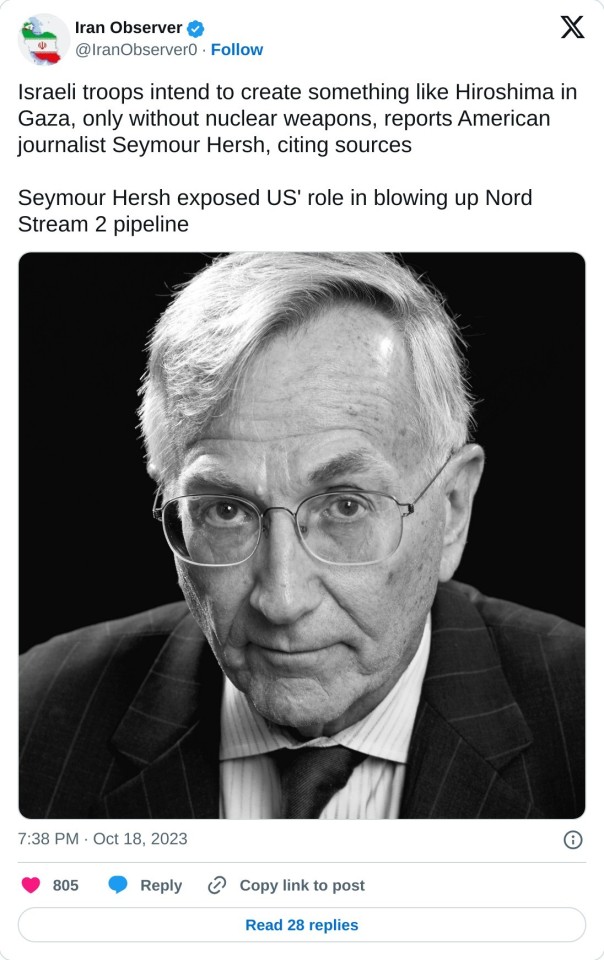
I've seen people on twitter say that the hospital bombing was done deliberately to normalise IDF soldiers to mass civilian deaths in places like hospitals, schools, places of worship, etc. I don't know if I believe that - I think they wanted to push Iran and Hezbollah's buttons before hiding behind Biden. I don't think these people are thinking strategically.
As far as the possibility of regional war is concerned, all indicators show that the West preparing for the war to escalate


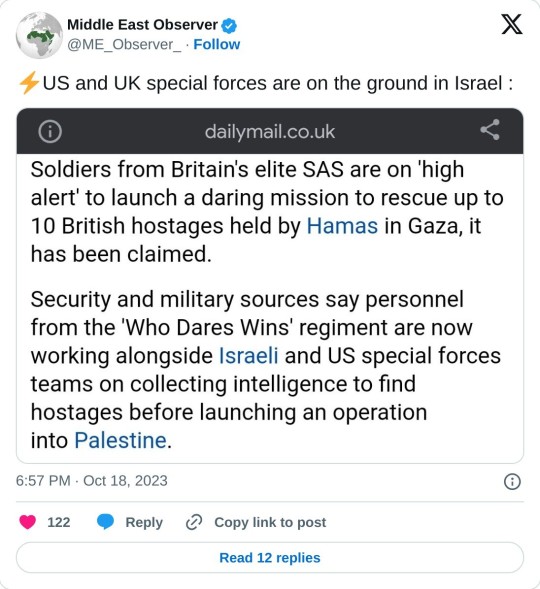
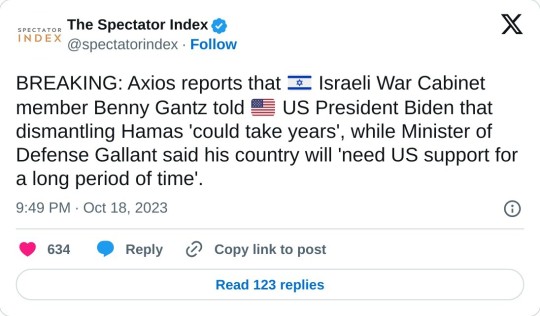
Seems to me the Israel has seen what Ukraine has received in just a year and a half of war. They're done receiving a paltry 3.8 billion every year and now prepared to drag out the conflict and I can't say I blame with Biden proposing a 100 billion package for both Ukraine and Israel. This will stretch America too thin as far as funding in concerned. Cracks are already showing
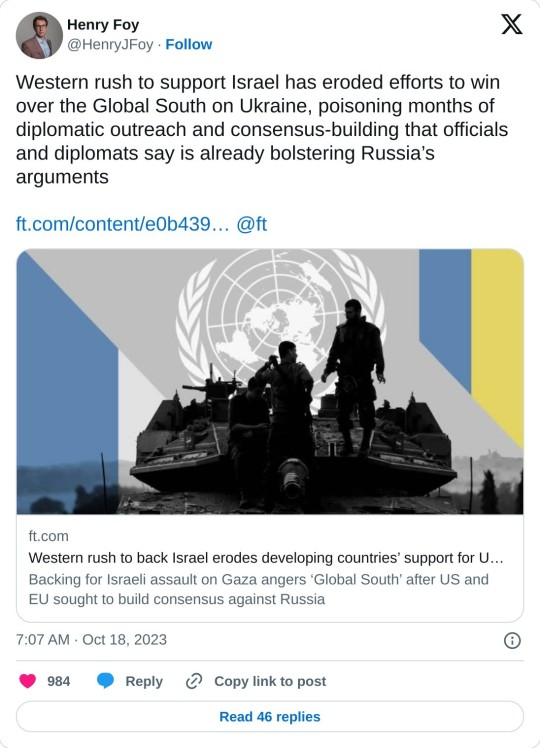
There are parts of the US government that is unhappy that the Ukraine war is losing attention. During the Ukraine war, you had parts of the government that wanted focus to shift from Russia to China. Because of that, the US government has spent the past year alternating between hostility to Russia and threatening to go to war with China over Taiwan. When Niger expelled France from within its borders, America was preparing to join that conflict until Mali and Burkina Faso declared they would fight with Niger. Now they're entering a third front in West Asia. In short, the mighty empire is expending a lot of resources right now and it is not the threat it was when it invaded Iraq and Afghanistan in the early 2000s.
At any rate, the ground invasion of Gaza won't go the way Israel and America hopes it will
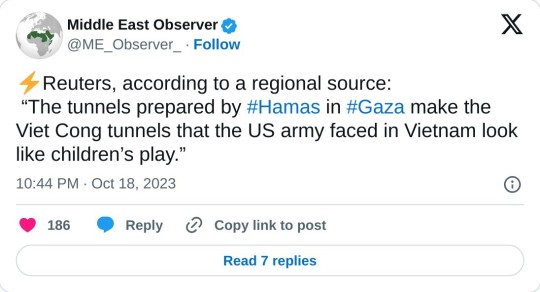
The coalition of Palestinian resistance fighters are still patiently waiting for the IDF to come meet them. Their allies aren't backing down either


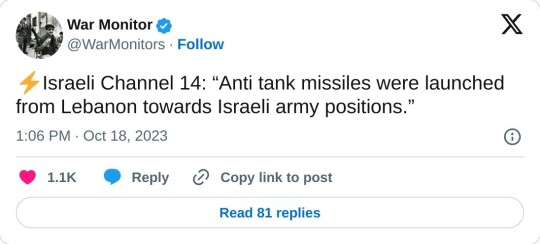
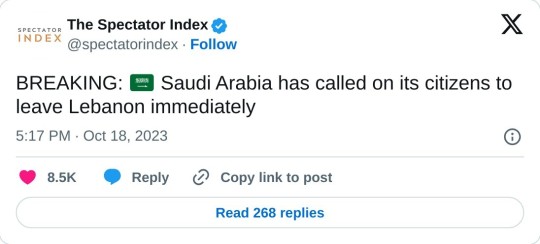
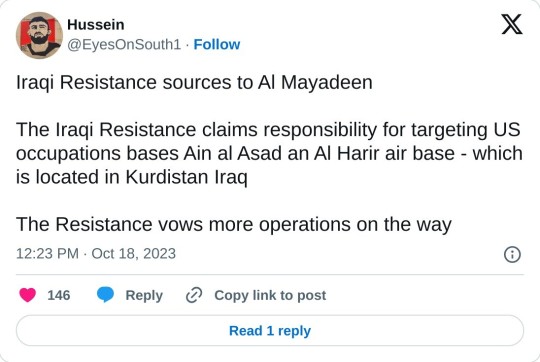
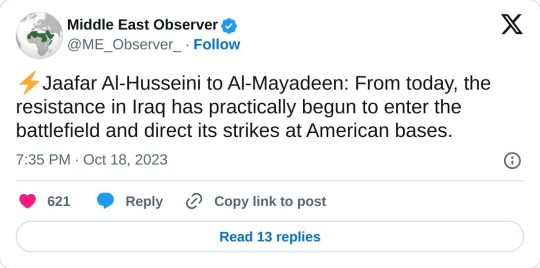
The reason I keep making these posts is to remind people that, while the genocide of the people of Gaza is horrifying, the war for the liberation of Palestine has not yet been lost.
Do not lose hope. From the river to sea, Palestine WILL be free
1K notes
·
View notes
Text
Ukrainians are breaking their ties with the Russian language
By Francesca Ebel and Kostiantyn Khudov

KHARKIV, Ukraine — In Kharkiv, a historically Russian-speaking city in eastern Ukraine, just 25 miles from the Russian border, Ukrainian classes are in high demand. Waiters, hairdressers and shopkeepers have stopped using Russian. Ukrainian language books are flying off the shelves, and local publishers are struggling to keep up with orders.
One of Russian President Vladimir Putin’s central — and false — justifications for invading Ukraine, that he was defending Russian-speaking people, has backfired dramatically.
In cities across Ukraine, people started bringing their Russian literature to local recycling stations to be shredded and converted into toilet paper. Street names have been changed to honor Ukrainian heroes instead of Russian writers. Russian dishes, like pelmeni dumplings, have been relabeled on restaurant menus. Radio stations stopped playing songs by Russian artists, long popular in Ukraine.
“For many people, it has become impossible to speak Russian because it is the language of the enemy,” said Iryna Pobidash, an associate professor of linguistics at Kyiv’s Igor Sikorsky Polytechnic Institute. “Russian is now a marker of everything that has happened: a marker of pain and tragedy.”
“Language is not only about communication, but also about positioning oneself. It’s my ‘who am I?’” Pobidash added.
Ukrainian author Andrey Kurkov, who writes novels only in Russian, said that after the invasion, he felt “in pain” when writing because he was so ashamed of Russia.“I understood that Russia was destroying itself and destroying Russian language culture worldwide,” he said.
READ MORE
#language#literacy#linguistic imperialism#ukrainian literature#russian literature#russia invasion#librarians#cultural identity#writing community
56 notes
·
View notes
Text
Given that many of Europe’s populist parties have Russia-friendly inclinations, it is perhaps not surprising that they often like to parrot Kremlin talking points. These days, that includes calling for an end to Western sanctions against Moscow, as many European parties ranging from the far right to the far left have demanded.
The usual narrative behind the demand to lift sanctions against Moscow is basic: France’s National Rally, Germany’s Alternative for Germany, and Hungarian Prime Minister Viktor Orban all argue that sanctions have backfired, harming European economies while not hurting Moscow. With populist parties across the European Union gearing up for elections to the European Parliament in June, such narratives will only gain in prominence. That makes it high time to debunk these erroneous claims.
The most popular talking point for Russia-friendly politicians is that sanctions are ruining European companies and consumers. The most widespread of these claims—that sanctions have caused high energy prices (and inflation) in Europe—is the easiest to disprove: It was Russia’s attack on Ukraine and gas blackmail against Europe that set off the spike in global hydrocarbon prices in early 2022. Western countries only began to impose sanctions on Russia’s energy exports in November of that year, when oil and gas prices were already in retreat.
Another claim is that sanctions are penalizing the EU’s export-oriented firms, which have lost access to the Russian market. The reality, however, is probably more benign: Russia has never been a major market for EU firms, with Russian businesses buying just 4 percent of EU exports in 2021. Considering that about half of EU exports to Russia fall under sanctions, this means that only 2 percent of EU exports are affected—hardly a make-or-break figure.
Country-level data from Centre d’Etudes Prospectives et d’Informations Internationales, a French research center, confirms this assessment. It shows that the impact that sanctions against Russia have on the French economy is almost negligible, with only 0.8 percent of French exports, or about 4 billion euros ($4.4 billion), affected. For perspective, this represents 0.1 percent or so of French GDP. The study only covers France, but these findings would probably not be drastically different in other EU economies. Alongside German companies, French firms were among those in Europe that had the deepest ties to Russia. This suggests that firms in many other European countries are even less affected.
Another version of the Kremlin-friendly claim that sanctions are crushing European economies rests on the idea that EU firms were forced to abandon their investments in Russia because of sanctions. The Financial Times, for instance, calculated that between the start of the full-blown invasion of Ukraine and August 2023, European businesses recorded losses of around 100 billion euros ($109.4 billion) from their Russia operations.
This figure may be accurate, but the idea that it has much to do with sanctions does not hold up to scrutiny. At this stage, sanctions do not prevent European firms from doing business in Russia except in some specific sectors, such as defense. Instead, European companies’ losses in Russia have two other causes. The first is that many companies have chosen to pull out—for fear of reputational risks or because they do not want to pay Russian taxes and thus contribute to Moscow’s war.
The second cause of losses is a spike in asset seizures, with the Kremlin forcing many European firms to sell their assets under value—in some cases for just one ruble. In other words, even in a hypothetical world without sanctions, European firms that once bet on the Russian market would now face large-scale losses. Of course, the Kremlin argues that expropriations are just a means of retaliation against sanctions. This line is only one more item in the long list of Moscow’s bogus claims that it only seeks to defend itself against Western aggression.
Another talking point that European populist politicians like to peddle is that European sanctions on Russian energy are not just costly—a false claim, as we have seen—but useless. There are several versions of this myth, but the most popular one is that the EU oil embargo and the oil price cap agreed upon by G-7 and EU member nations do not affect Russian oil producers because they were able to reroute oil shipments to India.
Indeed, Indian refiners now absorb the bulk of crude oil exports from Russia’s Baltic ports, which previously served Europe. Yet this view eclipses the fact that for Moscow, selling oil to Indian refiners is far less lucrative than selling it to Europe. Sea routes to India are far longer (and therefore costlier) than those to Europe. In addition, Indian buyers are able to drive a bargain: They believe they are doing the Kremlin a favor by compensating for the loss of the European market—and are therefore entitled to steep discounts on Russian oil.
A study from the Kyiv School of Economics shows that the damage to Russia is far from negligible. Over the past two years, the Kremlin lost an estimated $113 billion in oil export earnings, mostly due to the EU embargo on Russian oil. Last year, when both the EU embargo and the G-7/EU oil price cap became fully effective, Russia’s overall trade surplus shrank by 63 percent to $118 billion, constraining the Kremlin’s financial resources to wage the war in Ukraine.
This year may not be any better for Russian oil exporters: Last month, the Kremlin announced that oil firms would need to give up part of their profits to compensate the state for lower export earnings. For the likes of Russian oil company Rosneft, this is the first time that Moscow is asking domestic energy firms for direct help in financing the war effort.
As sanctions enforcement steps up, the idea that sanctions are useless will hold even less water. Since October, the United States imposed sanctions on 27 tankers that had been transporting Russian oil in circumvention of the G-7/EU oil price cap, a measure that makes it illegal for any firm based in either bloc to do business with these tankers. This highlights a drastic change in Western sanctions interpretation. Until recently, the price cap only applied when a G-7 or EU-based shipping or insurance company was involved in transporting Russian oil. Washington now interprets the link to Western companies far more broadly.
For example, Liberia-flagged tankers, which make up a significant share of Russia’s ghost fleet, are now liable to the oil price cap because Liberia outsources its flagging operations to a U.S.-based company. In parallel, Western countries have stepped up pressure on Indian refiners in a bid to prompt them to ditch Russian supplies. To the Kremlin’s dismay, these efforts appear to be effective: Since the start of this year, Indian imports of Russian crude have gradually dropped by about one-third from their May 2023 peak.
The populists’ argument that sanctions harm Europe more than they hurt Russia does not hold up to scrutiny. The reality is that the impact of these measures on European companies is small, whereas Russia is facing increasing headwinds as it tries to reroute its crude away from Europe.
The claim that sanctions are costly and ineffective is easy to debunk, but this narrative does not appear likely to go away any time soon. As Russia-friendly politicians step up their campaigning for the European Parliament and other elections, one can only expect these talking points to become ever more prevalent in the coming weeks. That may be yet another sign that these myths are wrong: If sanctions were not having a serious effect on Russia, the Kremlin and its allies in the West would probably not spend as much energy trying to undermine them.
6 notes
·
View notes
Note
Hello! I’m sorry you’re getting hate about That post. It’s never great to to memeify human lives ending, and I’m not condoning it, but it’s like…a morale booster for Ukrainian soldiers, y’know? I’ve never been in war, I come from a pretty safe country (relatively speaking), but it’s so obvious what the sentiment behind those memes is supposed to be. Anyway, I hope those anons leave you alone soon, and I hope op of That post picks up a book on boosting morale in war soon.
Sure, I don't personally know any soldiers who may be sharing those for morale, but I have a handful of friends who spend nights in underground subway stations and are wounded and angry and desperate and find solace in what they can. But to western kids playing simplistic heroics on social media, it is not always fitting to drill down to such moments of human anger, because rationalizing that ugly side of war with a pacifist ego is impossible. It is always exclusively a psyop aimed squarely at their own comfort and peace of mind because that is the type of information war they can participate and win at. And I don't really blame that impulse too much. I just hope it doesn't backfire in the long term.
For context, I was 16 when russia attempted their little invasion of my country, and I certainly had severe lapses of hatred that would look very damning if I had recorded them online. If that retroactively makes me a scumbag, I guess I'll take it
20 notes
·
View notes
Text
Wednesday, September 20, 2023
What to Expect When You’re Expecting the U.N. General Assembly
(Foreign Policy) As world leaders descend on the United Nations headquarters in New York City, the international body is fighting to maintain its relevance in a world it wasn’t built for when it was established nearly 80 years ago. Global powers are increasingly circumventing the unwieldy U.N. system to conduct multilateral diplomacy, such as through the G-7, G-20, and BRICS (Brazil, Russia, India, China, and South Africa) blocs. Eight years ago, the U.N. outlined an ambitious batch of goals to tackle global poverty, gender equality, climate change, and other pressing global issues by 2030. But so far, the world is way off target in meeting those goals. The war in Ukraine has frontally challenged one of the U.N.’s most fundamental purposes, enshrined in its foundational charter, of averting major wars. The Western world’s laser focus on the conflict in Ukraine, meanwhile, has frustrated other countries in the global south as other dire humanitarian catastrophes—conflict in Sudan, coups across Africa, the migration crisis in Central America, and a lot of climate-related disasters—struggle for resources and high-level attention.
Canada’s surging food prices
(Reuters) Canada’s plan to bring down food prices by tightening regulation could backfire and fail, raising the cost of doing business in the country without providing relief to consumers, lawyers and economists said. Canada’s weak competition law has been long blamed for allowing a few players to dominate industries ranging from banks to telecoms and groceries. Last week, Prime Minister Justin Trudeau promised to amend the Competition Act to help bring down prices. Trudeau’s move comes as many Canadians reel under an affordability crisis with food prices jumping 25% since the start of the COVID-19 pandemic in 2020. At the same time, the central bank’s efforts to bring down inflation by raising interest rates to a 22-year-high have pushed up mortgage costs for homeowners and made buying a home unaffordable for others.
U.S. National Debt Tops $33 Trillion for First Time
(NYT) America’s gross national debt exceeded $33 trillion for the first time on Monday, providing a stark reminder of the country’s shaky fiscal trajectory at a moment when Washington faces the prospect of a government shutdown this month amid another fight over federal spending. It came as Congress appeared to be faltering in its efforts to fund the government ahead of a Sept. 30 deadline. Unless Congress can pass a dozen appropriations bills or agree to a short-term extension of federal funding at existing levels, the United States will face its first government shutdown since 2019. The debt is on track to top $50 trillion by the end of the decade, as interest on the debt mounts and the cost of the nation’s social safety net programs keeps growing.
Brazil’s Lula pitches his nation—and himself—as fresh leader for Global South
(AP) “Brazil is back.” That has been Luiz Inacio Lula da Silva’s refrain for the better part of the last year, with the president deploying the snappy slogan to cast Brazil—and himself—as a leader of the Global South no longer content to abide the world’s outdated workings. During Lula’s travels, he has pushed for global governance that gives greater heft to the Global South and advocating diminishing the dollar’s dominance in trade. He has made clear that Brazil has no intention of siding with the United States or China, the world’s two largest economies and Brazil’s two biggest trading partners. And he has refused to join Washington and Western Europe in backing Ukraine’s fight against Russia’s invasion, instead calling for a club of nations to mediate peace talks. After the International Criminal Court issued a warrant for Russian President Vladimir Putin’s arrest, Lula said he would review Brazil’s membership in the court.
Germany’s economy struggles
(AP) For most of this century, Germany racked up one economic success after another, dominating global markets for high-end products like luxury cars and industrial machinery, selling so much to the rest of the world that half the economy ran on exports. Jobs were plentiful, the government’s financial coffers grew as other European countries drowned in debt, and books were written about what other countries could learn from Germany. No longer. Now, Germany is the world’s worst-performing major developed economy, with both the International Monetary Fund and European Union expecting it to shrink this year. It follows Russia’s invasion of Ukraine and the loss of Moscow’s cheap natural gas—an unprecedented shock to Germany’s energy-intensive industries, long the manufacturing powerhouse of Europe. Germany risks “deindustrialization” as high energy costs and government inaction on other chronic problems threaten to send new factories and high-paying jobs elsewhere, said Christian Kullmann, CEO of major German chemical company Evonik Industries AG.
Evidence Suggests Ukrainian Missile Caused Market Tragedy
(NYT) The Sept. 6 missile strike on Kostiantynivka in eastern Ukraine was one of the deadliest in the country in months, killing at least 15 civilians and injuring more than 30 others. The weapon’s payload of metal fragments struck a market, piercing windows and walls and wounding some victims beyond recognition. Less than two hours later, President Volodymyr Zelensky blamed Russian “terrorists” for the attack, and many media outlets followed suit. Throughout its invasion of Ukraine, Russia has repeatedly and systematically attacked civilians and struck schools, markets and residences as a deliberate tactic to instill fear in the populace. But evidence collected and analyzed by The New York Times, including missile fragments, satellite imagery, witness accounts and social media posts, strongly suggests the catastrophic strike was the result of an errant Ukrainian air defense missile fired by a Buk launch system. Air defense experts say missiles like the one that hit the market can go off course for a variety of reasons.
In Moscow, the War Is Background Noise, but Ever-Present
(NYT) Metro trains are running smoothly in Moscow, as usual, but getting around the city center by car has become more complicated, and annoying, because anti-drone radar interferes with navigation apps. Almost 19 months after Russia invaded Ukraine, Muscovites are experiencing dual realities: The war has faded into background noise, causing few major disruptions, and yet it remains ever-present in their daily lives. There is little anxiety among residents over the drone strikes that have hit Moscow this summer. No alarm sirens to warn of a possible attack. The city continues to grow. Cranes dot the skyline, and there are high-rise buildings going up all over town. But for some, the effects of war are landing harder. Nina, 79, a pensioner who was shopping at an Auchan supermarket in northwestern Moscow, said that she had stopped buying red meat entirely, and that she could almost never afford to buy a whole fish. Nina said that sanctions and ubiquitous construction projects were some reasons for higher prices, but the main reason, she said, was “because a lot is spent on war.”
India, Canada expel diplomats over accusations Delhi killed Sikh separatist
(Washington Post) India expelled a Canadian diplomat on Tuesday in a tit-for-tat move after Canadian officials accused Indian government operatives of gunning down a Sikh separatist leader, Hardeep Singh Nijjar, in British Columbia and threw out an Indian diplomat they identified as an intelligence officer. Canadian Prime Minister Justin Trudeau’s allegation of assassination, made during an explosive speech before Parliament on Monday, sent relations between the two nations tumbling toward their lowest point but also held broader ramifications for ties between the U.S.-led alliance and India, which the Biden administration has assiduously courted as a strategic counterweight to China. The Indian government issued a statement Tuesday rejecting Trudeau’s accusation as “absurd and motivated.” India’s Foreign Ministry went on to say that the allegations “seek to shift the focus from Khalistani terrorists and extremists, who have been provided shelter in Canada and continue to threaten India’s sovereignty and territorial integrity. The inaction of the Canadian Government on this matter has been a long-standing and continuing concern.” (BBC) India has been increasing the pressure on countries with significant Sikh communities, like Canada, Australia and the UK, saying they are failing to tackle what it calls "Sikh extremism." Mr. Nijjar is the third prominent Sikh figure to have died unexpectedly in recent months.
Libya’s flood turmoil
(Worldcrunch) Hundreds of protesters rallied in Libya’s Derna on Monday, setting fire to the house of the man who was the city’s mayor at the time of the flood, to demand accountability one week after a flood that killed thousands of residents. Meanwhile, the UN has warned that a disease outbreak could create “a second devastating crisis” as people are falling ill from contaminated water.
Crisis and Bailout: The Tortuous Cycle Stalking Nations in Debt
(NYT) Emmanuel Cherry, the chief executive of an association of Ghanaian construction companies, sat in a cafe at the edge of Accra Children’s Park, near the derelict Ferris wheel and kiddie train, as he tallied up how much money government entities owe thousands of contractors. Before interest, he said, the back payments add up to 15 billion cedis, roughly $1.3 billion. “Most of the contractors are home,” Mr. Cherry said. Their workers have been laid off. Like many others in this West African country, the contractors have to wait in line for their money. Teacher trainees complain they are owed two months of back pay. Independent power producers that have warned of major blackouts are owed $1.58 billion. The government is essentially bankrupt. After defaulting on billions of dollars owed to foreign lenders in December, the administration of President Nana Akufo-Addo had no choice but to agree to a $3 billion loan from the lender of last resort, the International Monetary Fund. It was the 17th time Ghana has been compelled to turn to the fund since it gained independence in 1957. The tortuous cycle of crisis and bailout has plagued dozens of poor and middle-income countries throughout Africa, Latin America and Asia for decades.
Many of today’s unhealthy foods were brought to you by Big Tobacco
(Washington Post) For decades, tobacco companies hooked people on cigarettes by making their products more addictive. Now, a new study suggests that tobacco companies may have used a similar strategy to hook people on processed foods. In the 1980s, tobacco giants Philip Morris and R.J. Reynolds acquired the major food companies Kraft, General Foods and Nabisco, allowing tobacco firms to dominate America’s food supply and reap billions in sales from popular brands such as Oreo cookies, Kraft Macaroni & Cheese and Lunchables. By the 2000s, the tobacco giants spun off their food companies and largely exited the food industry—but not before leaving a lasting legacy on the foods that we eat. The new research, published in the journal Addiction, focuses on the rise of “hyper-palatable” foods, which contain potent combinations of fat, sodium, sugar and other additives that can drive people to crave and overeat them. The Addiction study found that in the decades when the tobacco giants owned the world’s leading food companies, the foods that they sold were far more likely to be hyper-palatable than similar foods not owned by tobacco companies. In the past 30 years, hyper-palatable foods have spread rapidly into the food supply, coinciding with a surge in obesity and diet-related diseases. In America, the steepest increase in the prevalence of hyper-palatable foods occurred between 1988 and 2001—the era when Philip Morris and R.J. Reynolds owned the world’s leading food companies.
Danish artist told to repay museum €67,000 after turning in blank canvasses
(BBC) A Danish artist has been ordered to return nearly 500,000 kroner ($72,000; £58,000) to a museum after giving it two blank canvasses for a project he named Take the Money and Run. The Kunsten Museum in Aalborg had intended for Jens Haaning to embed the banknotes in two pieces of art in 2021. Instead, he gave it blank canvasses and then told Danish media: "The work is that I have taken their money." A court has now ordered him to return the cash, minus 8% for expenses.
2 notes
·
View notes
Text
New Post has been published on Books by Caroline Miller
New Post has been published on https://www.booksbycarolinemiller.com/musings/the-shadow-knows/
The Shadow Knows

During the winter holidays, Britain’s Prime Mister, Rishi Sunak took a photo-op when he decided to serve breakfast at a homeless shelter. Sunak, reported to be worth $800 million, made a stab at being chummy as he handed a plate of eggs and sausages to a stranger standing on the opposite side of the steam counter. “Do you work in business, by any chance?” As the man reached for the plate that hung in midair, he stated the obvious. “No. I’m homeless. I’m here for a hot meal.” Finding common ground with a stranger can be difficult. Sometimes, it never happens. Sometimes connection takes a second. Since arriving in Congress (2021), House Republican Marjorie Taylor Green has engaged her Democratic associate Jaime Raskin in Twitter combat. No one could have guessed they were linked by a thread. Yet when Raskin announced he had cancer, Greene did an about-face. Her father had died of cancer. She knew the struggle that awaited her colleague. “I’ll be praying for Jaime Raskin,” she tweeted. Empathy is a grace that exists in most humans. It lifts us into spiritual realms but is ephemeral. Called upon too often or for too long a time, the flame dies out. Prolonged empathy morphs into grief; grief becomes despair; despair, falling alike upon those who suffer and those who help, leaves the spirit numb. insanity is the final transition. The Ukraine war is an example. The nation may be winning its battles, but its rubbled streets look nothing like a victory. How long will the people’s courage last and that of their supporters? Longer than the invaders’, I hope. Seeing his country mired in blood, one Russian propagandist’s despair touches upon insanity. Embrace death he exhorted his countrymen. “Life is highly overrated.” History is rife with nihilists like him. It is a state of mind as old as Biblical Masada and jihadism. In times of greatest stress, it can pass for Reason. Recently, the U. S. Supreme Court struck down New York’s gun control laws which were intended a cripple the growing number of mass shootings. The judges concluded that under the Second Amendment, the legislation violated the people’s right to protect themselves. That decision was based on its 2008 verdict in the District of Columbia v. Heller. There, the judges determined that “militia” in the Second Amendment covered an individual’s right to self-defense. Though reasonable on its face, the interpretation leaves citizens standing in crosshairs. One commentator rightly asked, “What happens when the people are no longer allowed to protect themselves from mass slaughter through their elected representatives and are left at the mercy of unelected judges who do not care if they are shot to death.” The marshmallow experiment reminds us that our human tendency is to secure what we have rather than plan for future unknowns. The impulse can goad us into precipitous action. In the 1990s, the United States may have acted impulsively when President Bill Clinton encouraged Urkaine’s desire for ties with Europe. Political scientist John Mearsheimer says Clinton’s decision destroyed a détente between Russia and the west and paved the way for Vladimir Putin’s invasion of its neighbor. Clinton disagrees. Graham Fuller, a political analyst, sides with Mearsheimer on the question and sees Ukraine’s struggles as a proxy war between the U. S. and Russia. He says we are making a similar mistake with China he continues. Our efforts to restrict that country’s growth have backfired, leading China to respond with its Belt and Road initiative —an economic development plan for third-world countries that China underwrites. The program has enjoyed success, particularly among nations in the southern hemisphere that have experienced the west’s military presence: Latin American, the Middle East, Africa, India, and parts of Asia. Finger-pointing, of course, is among the oldest ploys. At this moment, however, it poses danger because it diverts our attention from Damocles’s sword as it swings above our heads. I refer to climate change. In a recent version of nihilism, some scientists have abandoned the hope that we can escape annihilation. Those of us who dare to contemplate the future know that Marjorie Taylor Greene and Jamie Raskin have revealed the common ground that unites the species. Who becomes Speaker of the U. S. House in 2023 is irrelevant. At a visceral level, we know our charge. Either we work toward the common good. Or, we nurture our grudges and fall victim to the lengthening shadow of our annihilation.
#Bill Clinton#causes of the Ukranian war#China's Belt and Road initiative#Climate change#detante#District of Columbia v. Heller#Graham Fuller#gun control#humanity's future#Jaime Raskin#Jihadism#John Mearsheimer#Majorie Taylor Green#Masada#New York gun contgrol laws#nihilism#Rishi Sunak#The Second Amendment and gun rightsn#U. S. Supreme Court#Ukraine's war#Vldimir Putin
2 notes
·
View notes
Text
Breif descriptions of each of my OC stories(in order of when they were first created):
(Keep in mind these are all WIPs, nothing I say here is fully set in stone).
Code XIII:
A zombie story set in cold war America(more specifically on an island in Southern California), following a naive university student named Calvin accidentally getting caught up in the creation of a bioweapon to be used against Soviet Russia, which, as you might expect, backfires horribly and starts infecting the fictional island town(which I have not named yet).
Shadows of the Abandoned:
An anthology focused on various different characters from various different time periods living in a world where the physical incarnations of light and darkness can make humans functionally immortal, for the better or for the worse.
[this one's still untitled lmao]:
A science-fictiony story about a man and his spunky adopted child trying to defend humanity against alien invasion, all while trying to keep the people of earth blissfully ignorant(it's a darkly comedic and pretty lighthearted monster-of-the-week sort of idea, inspired by Invader Zim and to a certain extent RotTMNT)
Dust Haven:
An adventure story taking place in a huge overcast desert-valley, with enormous bug/dragon-like creatures burrowing through the sand, humans protecting their settlements with either magic of just a big ol' fuckin' wall in their centermost city(aka the titular Dust Haven). It's mostly inspired by D&D and Hollow Knight(because of course my favorite video game of all time would inspire me creatively(hell, one of the characters here is just an HK oc that I repurposed)).
#code xiii#shadows of the abandoned#dust haven#(i can't tag the unamed story yet for obvious reasons but i agknowledge its existence)
2 notes
·
View notes
Text

Video records participation of Russian Tu-22M3 bombers in Ukraine
Fernando Valduga By Fernando Valduga 05/14/22 - 11:48 AM in Military
This week, a video appeared on social networks allegedly showing the launch of two Kh-22 missiles ('AS-4 Kitchen') from a Tu-22M3 bomber in Ukraine. The Kh-22 was developed in the 1960s, it is an old weapon, something like 1.5 generation of Soviet guided missiles.
Russia's failure to achieve air superiority in Ukraine has been described as one of the most significant mistakes that Moscow has made. The Russian Air Force was expected to play a vital role in the invasion, which could have allowed ground forces to enter deep into Ukraine and take Kiev.
It wasn't due to lack of experience or capacity. Russia has almost 4,000 fighter planes and has experience with bombing targets in Syria, Georgia and Chechnya.

Perhaps seeing the missed opportunity in recent weeks, Moscow has deployed its force of modernized Tu-22M3 bombers armed with Kh-22 missiles to hit the Ukrainian rail system. Such operations were initially conducted with cruise missiles, including the Kh-101 and Kh-555 and launched by Tupolev Tu-95 and Tu-160 bombers, but in recent weeks a change has apparently been made to the Tupolev Tu-22M3 (NATO reporting name "Backfire").
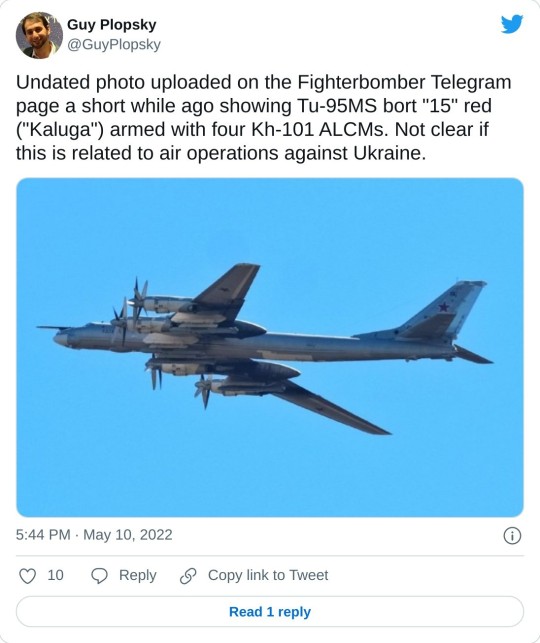
According to a report by The Aviation Geek Club, Russian ammunition is being depleted faster than can be replaced - and as a result, the Russians have deployed older stocks of the Kh-459 ("AS-13 Kingbolt") and other Cold War missiles.
The video that circulated online shows the launch of two heavy Soviet-era anti-ship Kh-22 ("AS-4 Kitchen") missiles from a Backfire bomber. The Kh-22 is remarkable, as it is probably much older than any of the pilots of the Tu-22M3 bombers - as it dates back to the 1960s. Designed to attack heavily protected ships or targets on land, it was far from being a precision missile. He had a circular error probably about three miles and, as a result, was typically equipped with a nuclear warhead.

The Kh-22 is powered by a Tumanski liquid fuel rocket engine, fueled with TG-02 (Tonka-250) and IRFNA (inhibited red steaming nitric acid), giving it a maximum speed of Mach 4.6 and a range of up to 600 km (320 nautical miles). The first ready-to-service missiles were introduced in 1962, but it took 60 years to see actual use in combat.

The hang gliding missile is powered by a liquid fuel rocket and is usually launched from a Tu-22M3 flying at a speed of Mach 1.5. The missile then accelerates to Mach 3 before approaching the target. In its terminal phase, the missile dives at a sharp angle and reaches a maximum speed greater than Mach 4. Each Tu-22M3 can carry up to three of these missiles in overload configuration, although one is more usual.

It has been suggested that the war in Ukraine is now just one way for Moscow to get rid of its old Cold War ammunition.
In mid-April, it was widely reported that Tu-22M3s had been used to bomb the Azovstal steel factory in Mariupol, a Ukrainian resistance site that still continues. It is not clear whether these "bombing" attacks involved cruise missiles, as well as the free-falling "dumb" bombs that the Tu-22M3 can also carry internally and externally.
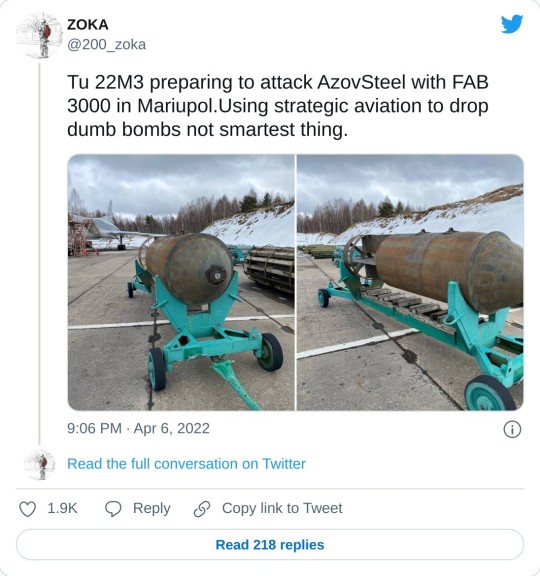
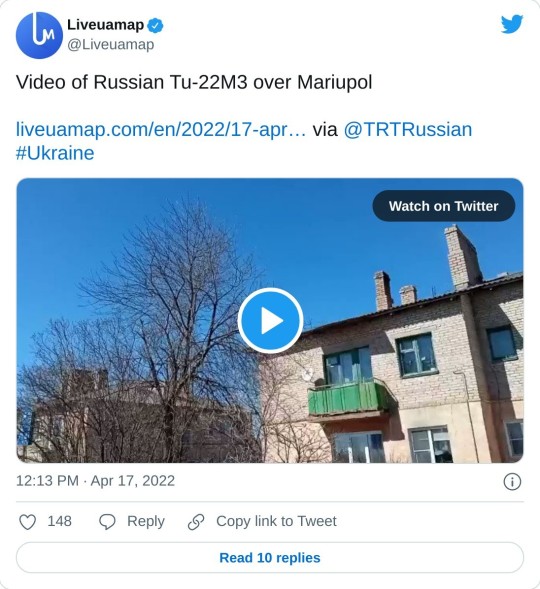
The aircraft carrying the Kh-22 are also showing their age. The Tu-22M3 is a modernized version of the Cold War long-range bombers that entered service in the late 1950s and were designed to target land and sea targets with supersonic missiles and bombs. The bombers have an operational range of 7,000 km and are capable of carrying nuclear weapons.

The Tu-22M3 model, which was developed in the early 1980s, officially entered service in 1989. It was one of the few Soviet bombers to go into combat when it was used at the end of the Russo-Afghan War.
Russia currently maintains a force of more than 100 Tu-22M bombers in all configurations.
Earlier this month, a U.S. defense officer said that Russia had launched almost 2,125 missiles in Ukraine in 68 days of war, or just over 30 missile launches a day. However, it was not clear how many of them were thrown off the air.
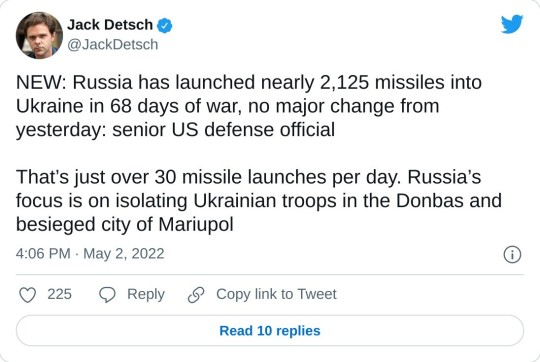
With the most advanced cruise missile stocks apparently decreasing rapidly, it would not be a surprise if the use of the Tu-22M3 in the war in Ukraine really increased as the air campaign continued.
Tags: Military AviationTu-22M3War Zones - Russia/Ukraine
Fernando Valduga
Aviation photographer and pilot since 1992, he has participated in several events and air operations, such as Cruzex, AirVenture, Dayton Airshow and FIDAE. He has works published in a specialized aviation magazine in Brazil and abroad. He uses Canon equipment during his photographic work in the world of aviation.
HOME Main Page Editorials Information Events Collaborate SPECIALS Advertise About
Cavok Brasil - Digital Tchê Web Creation
7 notes
·
View notes
Text
EXCELLENT! 👍🏼 🇺🇦 The only way to end the war for good will be with Putin's defeat.
A flagship Russian long-range bomber has been destroyed in a Ukrainian drone strike, according to reports.
Images posted on social media and analysed by BBC Verify show a Tupolev Tu-22 on fire at Soltsy-2 airbase, south of St Petersburg.
Ukraine had not been very active in that region. Soltsy is 124 miles/200 km south of Putin's hometown St. Petersburg.
The Kremlin is pretending that this is not a big deal.
Moscow said that a drone was hit by small-arms fire but managed to "damage" a plane. Ukraine has not commented.
The Tu-22 can travel at twice the speed of sound and has been used extensively by Russia to attack cities in Ukraine.
[ ... ]
It stated the location as "a military airfield in the Novgorod region", where Soltsy-2 is situated.
"The UAV was detected by the airfield's observation outpost and was hit with small-arms fire," the ministry said.
The point is to make the Kremlin feel insecure and cause the Russian military to divert resources to protecting locations which were previously thought to be immune to attack. Soltsy-2 is about 620 km from Ukraine.
The location of this attack is directly related to Russia's terrorist attacks on Ukrainian civilians.
The Tu-22 is a Cold War-era, swing-wing supersonic bomber, codenamed "Backfire" by Nato, which has been used extensively in attacks on Ukrainian cities.
Modern versions such as the Tu-22M3 can reach speeds of Mach 2 (2,300km/h or 1,430mp/h) and can carry up to 24,000kg of weapons, including "dumb bombs" and homing missiles.
They have been used in conflicts in Syria, Chechnya, and Georgia and most recently in Ukraine.
According to prosecutors in Kyiv, 30 people were killed when a Tu-22-launched missile hit a block of flats in Dnipro in January.
There is now one fewer Tu-22 (possibly two according to other reports) which can bomb Ukrainian maternity hospitals, schools, apartment buildings, and blood transfusion centers.
Russia is losing the war – but not fast enough. Give Ukraine whatever military hardware and weapons it needs except nukes.
The bottom line is that Russia has no fucking business in Ukraine. That's all anybody needs to know about this conflict.
#invasion of ukraine#ukrainian drones#russia#soltsy-2#tu-22#backfire bomber#russia is losing the war#vladimir putin#сольцы#ту-22#россия - террористическая страна#владимир путин#путин хуйло#добей путина#путлер#союз постсоветских клептократических ватников#россия проигрывает войну#руки прочь от украины!#геть з україни#йдемо на ви#вторгнення оркостану в україну#україна переможе#слава україні!#героям слава!
12 notes
·
View notes
Text
EU countries could follow Lithuania's example and implement a visa ban for Russian tourists, the country's Foreign Minister Gabrielius Landsbergis has told DW.
"People were forced to flee Ukraine, some of them are remaining there, fighting for their lives, fighting there for their homes ... while [people from Russia] are still free to travel and enjoy all the amenities of the free world, which their government is fighting against," the minister said.
Lithuania had "basically stopped all visa issuance to people who would go for recreation" and only issues visas in "humanitarian cause visas," Landsbergis said.
This, he emphasized, was not only for political, but also for practical reasons. Since 2020, Lithuania has "felt a huge influx of people fleeing Belarus and Russia."
"We found a way working with non-governmental organizations and other partners, where we are able to assess actually who has a humanitarian need and was running away from persecution," he said.
"Who do you issue a visa first? Is it a a family of an NGO member who might be persecuted, whose father or mother is being persecuted, or some tourist who wishes to spend a few lovely days by Lithuanian seashore?" he said.
In an interview with the Washington Post last week, Ukrainian President Volodymyr Zelenskyy urged European Union states to ban visas for Russian nationals.
Lithuania's Baltic neighbors Latvia and Estonia also no longer issue tourist visas to Russian citizens, However, a number of larger EU countries — including Germany — remain skeptical.
The question of weapons for Ukraine
Ever since the very first days of the Russian invasion, the Lithuanian government had said the conflict would be decided on the battlefield, Landsbergis told DW.
The foreign minister said that seeing what Ukrainians are doing with Western military equipment shows that they are able to fight off and even reclaim land occupied by Russia after the February 24 invasion.
"I truly believe and I hope that this is proof enough that Ukrainians are capable, able and trustworthy partners when it comes to defending the borders of Europe," Landsbergis said. "The more weapons that are provided [for Ukraine], the faster the war ends."
He also said that he would like to feel more "European pride, seeing more European weaponry provided to Ukraine" alongside the arms providede by the US. "But unfortunately, probably we [the EU] still don't have the capacity," Landsbergis said.
The role of transatlantic relations in Ukraine
Landsbergis stressed that European countries do a lot when it comes to hosting Ukrainian refugees or providing humanitarian aid to Ukraine.
However, when it comes to hard power fighting off the Russian invasion, it is NATO that carries the biggest weight.
"This year showed how important transatlantic unity is for both sides of Atlantic," the foreign minister said. According to Landsbergis, both sides [the USA and the EU] need each other to maintain the security infrastructure not only in the region, but also globally.
As for the EU contribution to the Ukraine crisis, the bloc should start thinking about the post-war situation, the minister said. The EU, having granted candidate status to Ukraine and Moldova, must support these countries in their "transition to full membership."
He also believes that Europe has to formulate a very clear strategy on Russia, which will be a signal to other potential invaders or disrupters of the global security order. The European Union has to be prepared for other possible conflicts in the region, such as a conflict between Kosovo and Serbia, Landsbergis said.
The EU and transit to Kaliningrad
Against the backdrop of concern in European countries about the coming winter, Landsbergis is certain that sanctions against Russia will not backfire on the EU as hard as expected in the energy sector. "It is always better to expect the worst and be prepared for the situation that might not be so good and then have the instruments to tackle the coming problems," he said.
He expressed his hope that Europe will be able to "return to increasing pressure on Russia when we see that we are able to handle the situation when it comes to energy and other things."
Earlier this summer, the EU overturned part of its policy regarding transit from mainland Russia to the Russian exclave of Kaliningrad on the Baltic Sea. Lithuania had wanted Brussels to maintain its original stance, Landsbergis said, but does not "feel betrayed.".
The foreign minister thinks the current quota system, in which Europe has set limits for transit of essential goods to Kaliningrad, is not ideal, but "just a certain compromise that we accepted," Landsbergis said.
Russia reacted angrily when Lithuania tried to block transit through Kaliningrad. But Vilnius was just implementing a "European decision," the minister said.
Moscow, he argued, chose to bully a "much smaller country like Lithuania" instead of turning on Brussels.
But despite Russian propaganda attacks, Lithuanians are not afraid of Russia, the minister assured. "We believe that NATO [of which Lithuania is a part] is the strongest and most capable alliance there is and there ever was," Landsbergis said.
6 notes
·
View notes
Text
In the complex tapestry of Ukraine's current landscape, a delicate dance between politics and warfare is unfolding, providing Russia with a potential opening to capitalize on internal strife. The recent offer extended to Anton Drobovych, head of Ukraine's Institute of National Memory, to become deputy culture minister serves as a poignant example. Despite his qualifications, Drobovych's reluctance stems from a keen awareness of the precarious political climate in Kyiv.
Drobovych is not alone in straddling two contrasting worlds—the brutal reality of trench warfare and the increasingly contentious political battleground in Kyiv. While competitive politics went dormant during Russia's invasion in February 2022, it resurfaced as the existential threat to Ukraine diminished. However, political unity has proven elusive, with jostling and power struggles destabilizing the nation. President Volodymyr Zelensky's attempts to centralize decision-making have backfired, leading to cracks not only along political lines but, more ominously, between military and political leadership.
Relations between Zelensky and Commander-in-Chief Valery Zaluzhny have soured, exacerbated by a public declaration from the latter that Ukraine's war had reached a stalemate. Zelensky's rebuke and subsequent warnings to stick to military affairs underscore the widening divide. A senior government source attributes this conflict to a stalled counter-offensive and a predictable blame game ensues.
#Ukraine political divisions#Military challenges in Ukraine#Russian opportunism in conflict#Ukraine#Russia#Ukraine internal rifts#Kyiv#Moscow
0 notes
Text
Russian dictator Vladimir Putin has raised the stakes in his war against Ukraine, and he may be paying the price.
By announcing the mobilization of conscripts on Sept. 21 and announcing the illegal annexation of more Ukrainian territory on Sept. 30, he increased domestic instability in Russia.
People who were content to watch the invasion as a reality show on television are reluctant to wage war and risk being killed. Others are disappointed with Russia's repeated defeats during Ukrainian counter-offensives in Kherson, Kharkiv, Luhansk, and Donetsk oblasts, some of which they consider to be Russian.
As a result, public discontent is growing, and fewer people are happy about Putin's leadership.
Russia's illegal and unrecognized annexation of Ukraine's Kherson, Zaporizhzhia, Donetsk, and Luhansk oblasts, which Russia has partly occupied, is also seen as a watershed moment that solidified the country's status as a pariah state.
Yet opinions differ on Russia's further prospects.
Some predict that a coup d'etat against Putin is more likely than ever. Others argue that Putin's regime is stable enough to crush dissent and prevent a coup or an uprising.
Mobilization backfires
The Russian authorities claimed that the mobilization was “partial” and envisaged multiple exemptions.
In reality, military enlistment offices have arbitrarily drafted those who have not served in the army and have no military experience, people with disabilities, those with severe diseases, and fathers with many children – who are supposed to be exempt.
Mobilized conscripts have been forced to buy uniforms and equipment at their own expense, and some conscripts have been sent to the front line without proper training.
"Mistakes" made during the mobilization have been admitted by Russian top officials and propagandists, as well as by Putin himself.
"They're infuriating people, as if on purpose, as if out of spite. As if Kyiv had sent them," the pro-Kremlin editor of Russia's state-run RT network, Margarita Simonyan, said on Sept. 24.
Instability mounts
Putin's decision to announce mobilization for the war against Ukraine contributed to political and social instability.
Before the mobilization, there was an informal pact between the Kremlin and the Russian population – society renounced their rights and civil liberties, but the Kremlin generally left them alone as long as they didn't enter politics, according to a view popular among Russian political analysts.
This opinion is shared, among others, by analyst Fyodor Krasheninnikov and human rights activist Marina Litvinovich.
The mobilization destroyed this pact by involving a major part of the population in a war, Krasheninnikov and Litvinovich believe.
According to a survey conducted by Levada, a Russian polling agency deemed independent, the share of those who approve of Putin's performance dropped from 83% in August to 77% in September.
Protests against the mobilization have taken place all over Russia.
The most large-scale protests took place in the republic of Dagestan in Russia's North Caucasus. Protesters clashed with the police and blocked a highway.
Demonstrations against the mobilization were held even in Chechnya, where dissent has always been stifled.
Chechen strongman Ramzan Kadyrov had to announce that there would be no mobilization in Chechnya, arguing that the republic had already sent enough volunteer fighters to Ukraine since Feb. 24.
Meanwhile, about two dozen military enlistment offices in Russia have been set on fire since the mobilization was announced. On Sept. 26, a local resident shot and wounded a military enlistment officer in Ust-Ilimsk, Irkutsk Oblast.
Wave of emigration
The mobilization also prompted one of the biggest waves of emigration in Russia's recent history, with hundreds of thousands of conscription-age men fleeing the country.
Forbes Russia reported on Oct. 4, citing sources close to Russia's Presidential Administration, that 700,000 people had left Russia since the mobilization began.
As a result of the mobilization, thousands of men fleeing mobilization created multi-kilometer lines on the Russian-Georgian border. The Russian authorities responded by setting up makeshift military enlistment offices on the border.
The brain drain caused by the mobilization and the cut in the workforce due to the draft will also aggravate Russia's economic problems, which are already suffering from unprecedented economic sanctions, according to an analysis by Bloomberg.
Is the mobilization campaign going well?
There have been predictions that the mobilization would fail in Russia due to the number of those dodging the draft and the bureaucratic machine's ineffectiveness.
However, so far, the mobilization appears to be working.
Russian Defense Minister Sergei Shoigu said on Sept. 21 that 300,000 would be mobilized.
According to the Conflict Intelligence Team, an open-source intelligence outfit, at least 213,200 people had been mobilized by Oct. 5.
Independent Russian news outlets Novaya Gazeta.Europe and Meduza reported in September, citing their sources, that a secret clause in Putin’s mobilization decree envisages mobilizing around 1 million people. The Kremlin has denied this report.
Sergei Sazonov, a Russian-born political philosopher at Estonia's Tartu University, argued that there is a great fear of the state in the Russian mentality, and conscripts from small towns and villages have few resources to evade the draft.
"They don't realize how likely they are to die," he told the Kyiv Independent.
Sazonov compared the current situation to the Soviet Union in 1941 when it managed to successfully carry out the mobilization of conscripts despite the effective destruction of its army by Nazi Germany.
But he added that one aspect of total warfare that Russia still lacks is the mobilization of the economy. The lack of economic mobilization will make it harder for Russia to produce enough weapons and equip its troops.
Coup or uprising?
As Russia is suffering defeats on the front line and as disaffection with mobilization is growing, instability in Russia is mounting. Just like after the start of the full-scale war in February, speculation has reappeared that Putin may be overthrown in a coup d'etat.
Russian political analyst Dmitry Oreshkin believes that a coup is possible.
But Putin is more likely to be overthrown by pro-war imperialists, not those who seek to end the war and seek a rapprochement with the West, Oreshkin told the Kyiv Independent.
"A struggle is taking place on the pilothouse of a sinking Titanic," he added.
The most outspoken leaders of the "hawk" party in Russia are Chechen strongman Kadyrov, Yevgeny Prigozhin, the leader of the private military company Wagner Group, and Igor Strelkov, a warlord who played a major role in launching Russia's war against Ukraine in 2014.
They have criticized Russia's military leadership for defeats and concessions.
Sazonov believes, however, that a coup is highly unlikely.
"Putin's regime is very stable," he said. "His opponents don't have a serious political base."
Sazonov said that Putin is protected by the Federal Protective Service (FSO), which is highly professional, and it would be hard for potential plotters to break through his security.
Both Oreshkin and Sazonov argued that a popular uprising is unlikely in Russia because Putin's regime would easily suppress any protests, and there is no organized opposition.
Selling the defeat
Even if Putin loses the war, he may still be able to use his propaganda machine to explain the defeat, and stay in power.
"Saddam Hussein lost the war but kept power," Sazonov said.
Oreshkin compared this situation to Stalin getting away with his de facto defeat in the Winter War with Finland in 1940.
"Putin controls law enforcement and the media," he said. "He can sell whatever he wants to the population."
Now repression is aimed against the anti-war movement, but in case of defeat, there will be repression against the hawks, Oreshkin said.
"To maintain control, he'll have to destroy the pro-war party," he added.
8 notes
·
View notes
Text
US’ Bet On Ukraine Is Starting To Backfire As It Fails To Reach Desired Goals
— Nebojsa Malic | April 27 2023

Illustration: Chen Xia/Global Times
When Russia-Ukraine conflict broke out in February 2022, the mood in Washington was almost celebratory. To the US, after eight years of refusing to step into the trap set by the 2014 US-backed color revolution in Kiev, the Kremlin had finally taken the bait. It thinks now Russian economy would be destroyed by sanctions and the ruble turned to rubble.
There was just one problem: none of it happened.
Moscow weathered the sanctions much better than US-allied Western Europe, whose economies dried up without Russian energy imports. The conflict exhausted not the Russian military, but the weapons and ammunition stockpiles of the West to Ukraine. Meanwhile, the leaders of Russia and China confirmed their joint commitment to a multipolar world.
While the powers in Washington insist the conflict is going great - Ukraine is winning! The sanctions are working! Military-industrial production will magically increase any day now! - Slowly, Americans are finally beginning to notice it isn't so.
Announcing his presidential run last week, Robert Francis Kennedy Junior argued that it is not in America's national interest to push Russia closer to China. That is a cataclysm. He also noted that The Chinese just brokered a peace deal between Iran and Saudi Arabia, US strategy in the Middle East has utterly collapsed and "our economy is going to follow if we don't do something fast."
A similar argument was put forth in the American Thinker magazine earlier this month. Authors Patricia Adams and Lawrence Solomon called the sanctions against Russia the most monumental miscalculation in modern history.
Back in 1972, Henry Kissinger sought to soften the sting of the US defeat in Vietnam by establishing relations with China, exploiting the split between Beijing and Moscow. For the next 50 years, the US policy would be to prevent anything resembling an alliance between China and Russia.
Yet as 2022 moved along, Washington went out of its way to antagonize Beijing, having numerous politicians declare the island of Taiwan to be another Ukraine, in need of Western weapons against an alleged Chinese invasion.
One possible explanation is that the US foreign policy establishment now mainly consists of the disciples of Zbigniew Brzezinski, and not Kissinger. In 1997, Brzezinski wrote a manual for US global hegemony titled The Grand Chessboard, focusing on controlling Ukraine as a way to prevent the resurgence of Russia.
Brzezinski has claimed credit for the demise of the USSR, arguing that his 1979 plan to support Islamic militants in Afghanistan was meant to trigger a Soviet invasion and give Moscow its own Vietnam. Even if one buys into that far-fetched and self-serving claim, it is indisputable that the blowback from this policy - the 9/11 attacks and the 20-year war on terror in Afghanistan and Iraq - ended up bleeding the US dry instead.
All of this brings to mind a bit of ancient wisdom. As recorded by Herodotus, king Croesus of Lydia had asked the Oracle at Delphi for advice on going to war. The king was told he would destroy a great empire; he declared war on Cyrus the Great of Persia — and lost. The prophecy came true, after a fashion: the empire Croesus destroyed had been his own.
— The author is a Serbian-American Journalist.
0 notes
Video
youtube
Congratulations to Finland on becoming the 31st member of NATO!
This is a tremendous and historic day for the alliance. We will all be stronger for the inclusion of Finland to the organization. Now, Putin faces a western border made up of NATO member states.
(The one exception is Belarus, but given that its leadership is merely a puppet for Russia, one can argue that Belarus is effectively part of Russia anyway.)
Now, let’s get Sweden added to NATO, too!
Putin sorely misunderstood what the reaction would be to his illegal invasion and occupation of Ukraine. He bet that it would cause Europe to cower in front of Russia’s might, but that backfired and instead he made the NATO alliance bigger and stronger instead of smaller and weaker.
Eläköön suomi! Long live Finland! 🇫🇮
1 note
·
View note